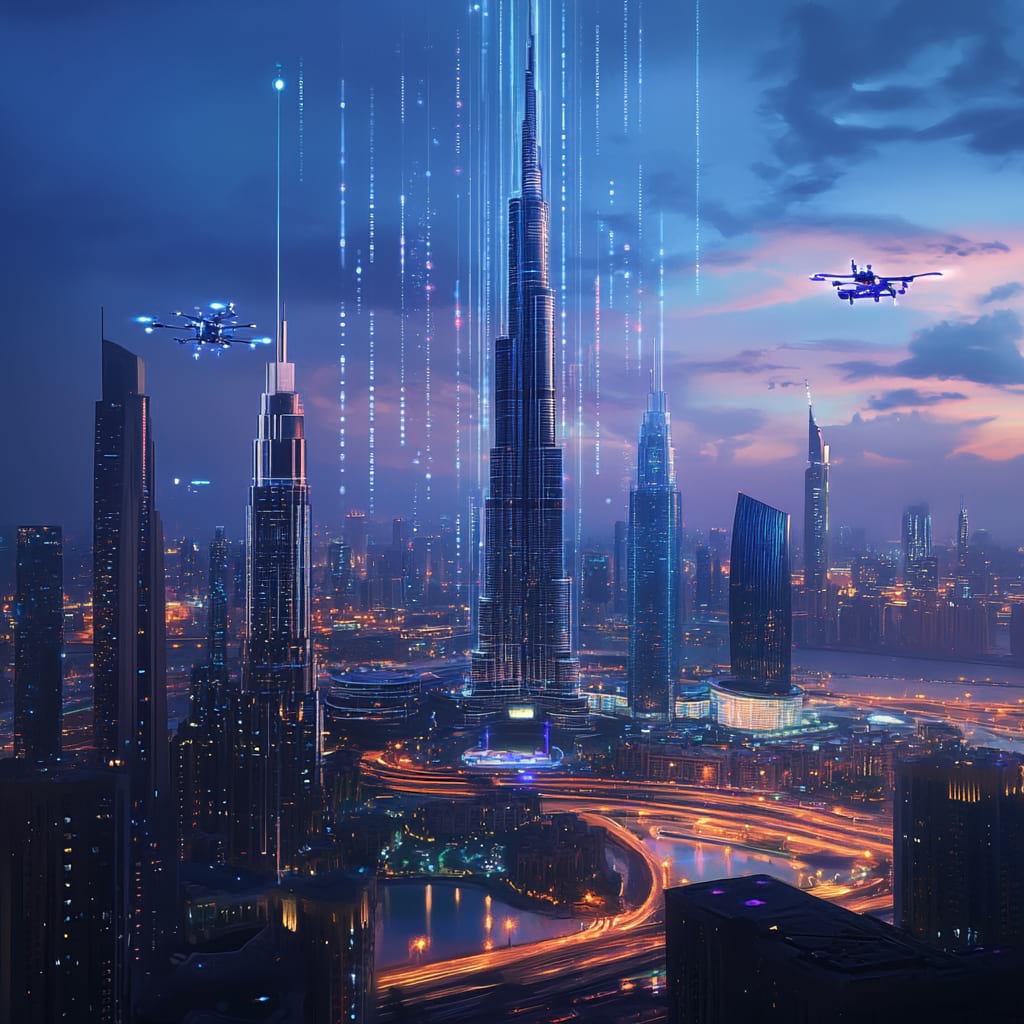Dubai’s Pioneering Journey in Artificial Intelligence and Generative AI

Dubai has set itself on a progressive path to becoming one of the world’s foremost smart cities, leveraging AI across sectors to foster economic growth, streamline governance, and improve the quality of life for residents and visitors alike. From government services and healthcare to transport and security, Dubai’s approach to adopting artificial intelligence—particularly generative AI—illustrates a commitment to transforming the city’s operational, economic, and social landscapes.
Dubai's Vision for Artificial Intelligence
In 2017, Dubai launched the UAE Artificial Intelligence Strategy 2031, aiming to establish the UAE as a global leader in AI by enhancing governmental efficiency and driving innovation. Dubai’s AI initiatives prioritize sectors that affect everyday life: transport, healthcare, cybersecurity, space, and education. By 2031, Dubai’s vision includes cutting administrative costs and increasing government productivity by 50%.
The Dubai Artificial Intelligence Lab was also established as part of this vision, offering a platform for developing AI projects to improve city services and integrate AI into decision-making processes.
Key Areas of AI Implementation in Dubai
1. Smart City Infrastructure
- Dubai is one of the most technologically advanced cities globally, with its Smart Dubai initiative focusing on AI-based technologies to improve governance, resource management, and daily citizen services. DubaiNow, a unified digital app, provides over 120 services for residents, integrating AI-driven features that personalize user experiences and simplify tasks like bill payments, parking management, and even legal inquiries.
- AI in Urban Planning: AI is used to analyze data on population trends, traffic flow, and environmental factors to optimize city planning and infrastructure. By implementing AI in this way, Dubai seeks to make the city not only more efficient but also more sustainable.
2. Healthcare Innovations
- Dubai’s healthcare sector has implemented AI to improve diagnosis accuracy and operational efficiency in hospitals. AI-enabled robotic surgeries, advanced imaging techniques, and diagnostics are widely adopted in hospitals like the Dubai Health Authority (DHA) facilities.
- Generative AI for Medical Research: Generative AI is being used to create predictive models in medical research, which assist in understanding disease spread patterns, genetic predispositions, and patient health outcomes. This not only accelerates research but also improves healthcare interventions.
3. Autonomous and Intelligent Transport
- Dubai’s Roads and Transport Authority (RTA) has been a frontrunner in adopting autonomous vehicle technology. Dubai has set an ambitious target to make 25% of all transportation autonomous by 2030. In addition, RTA has adopted AI in traffic management, using predictive analytics to reduce congestion and improve accident response times.
- AI-Powered Drones: Dubai Police and RTA use AI-enabled drones for surveillance, traffic monitoring, and infrastructure inspection. These drones are equipped with cameras and sensors to collect real-time data, enhancing safety and operational efficiency.
4. Security and Surveillance
- Dubai has invested heavily in AI for public safety. The Oyoon (Eyes) Project uses AI-powered surveillance systems that incorporate facial recognition, behavior analysis, and predictive modeling to detect potential threats in real time.
- AI in Crime Prevention: AI has enabled Dubai Police to predict crime hotspots and optimize patrol routes. The use of AI-powered predictive policing, which uses data analytics and pattern recognition, is instrumental in preventing crimes before they occur.
5. Financial and Business Services
- The Dubai International Financial Centre (DIFC) has emerged as a leading FinTech hub, attracting global FinTech and AI startups. With the DIFC FinTech Hive, Dubai encourages financial innovation, including the adoption of AI for fraud detection, risk assessment, and customer service.
- Generative AI in Financial Services: Dubai-based financial institutions are exploring generative AI for automating report generation, investment recommendations, and personalized financial advice. Generative AI’s ability to create vast amounts of data-driven content aids in crafting personalized services for clients.
Generative AI: Transforming Dubai's Innovation Landscape
1. Content and Media Creation
- Dubai’s media sector is leveraging generative AI to automate content creation. News agencies and advertising companies use AI to produce articles, marketing copy, and social media content, allowing for quicker and cost-effective campaign execution.
- Visual Content Creation: AI-powered platforms assist in creating images, videos, and animations tailored for digital advertising and entertainment sectors. This enables a greater level of customization for targeted marketing efforts.
2. Generative AI in Customer Service
- Dubai’s hospitality and retail industries use generative AI chatbots to provide real-time customer support. AI-driven virtual assistants manage queries, assist with bookings, and personalize guest experiences. The hospitality sector, for example, uses AI to suggest personalized services to guests, improving satisfaction rates.
- Government Customer Service: Dubai’s government entities have adopted generative AI chatbots like “RAHMA” (used in Dubai Health Authority) that provide round-the-clock assistance in multiple languages, enhancing public accessibility to government services.
3. Education and Training Programs
- AI and generative AI are used in educational platforms to provide personalized learning experiences. For instance, the Mohammed bin Rashid Al Maktoum Knowledge Foundation supports AI-based platforms to enable e-learning, content creation, and data-driven curriculum development.
- AI in Workforce Training: Dubai has introduced AI-driven training modules that simulate real-world scenarios for employee training in fields like customer service, healthcare, and public service.
4. Generative AI in Real Estate and Architecture
Real estate developers in Dubai have adopted generative AI to create realistic virtual property tours, enabling prospective buyers to experience properties remotely. AI is also used to optimize building design, simulating different layouts to maximize space utilization, natural lighting, and energy efficiency.
Ethics and Regulation of AI in Dubai
Dubai is keenly aware of the ethical implications of AI and generative AI technologies. As part of its Ethics and Governance of AI strategy, Dubai has implemented guidelines to ensure AI usage is fair, transparent, and respects user privacy. The Dubai Data Law governs the use of data, mandating secure data handling practices to protect personal information.
AI for a Resilient Future: What Lies Ahead
Looking forward, Dubai’s commitment to AI signifies a steadfast investment in long-term growth and resilience. With AI technology rapidly evolving, Dubai is establishing itself as a laboratory of real-world AI applications. The city’s forward-looking regulations, public-private partnerships, and commitment to data security position it as a trailblazer in AI and generative AI.
Conclusion
Dubai’s extensive and pioneering adoption of AI and generative AI stands as a testament to the city’s ambitions to not only lead the region but also become a global AI innovator. The strategic use of AI across sectors—from public safety and healthcare to business and real estate—illustrates how Dubai is reshaping urban life through cutting-edge technology, while continually setting new benchmarks for smart city initiatives worldwide.





